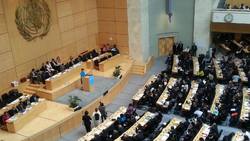World Health Organization to tackle non-communicable disease
The 66th World Health Assembly opened in Geneva today. One of the main issues is how the increasing burden of non-communicable diseases (NCD) will be handled in the future. Referring to the difference between malaria and NCDs the Director General of WHO, Dr. Margaret Chan, in her opening speech stated that “Mosquitoes do not have front groups, and mosquitoes do not have lobbies.”
 NCDs are among the issues to be discussed when health officials from the 197 member states of the World Health Organization meet in Geneva for the World Health Assembly (WHA) this week. Following up on the political declaration from the UN High Level Meeting on NCDs in 2011, the WHA is considering a Global Action Plan that has been developed during the last year.
NCDs are among the issues to be discussed when health officials from the 197 member states of the World Health Organization meet in Geneva for the World Health Assembly (WHA) this week. Following up on the political declaration from the UN High Level Meeting on NCDs in 2011, the WHA is considering a Global Action Plan that has been developed during the last year.
More information about the World Health Assembly is available at the WHO website
RELATED ARTICLES
- WHO consultation on global alcohol strategy and the way forward
- SAAPA applauds WHO position on no industry collaboration
- SAFER – a new WHO initiative to boost national alcohol policy processes
- UN High-Level Meeting on NCDs misses the target
- WHO Launches Global status report on alcohol and health 2018
- Bolder actions needed to reverse the tide of NCDs and mental disorders
- Norway objects to Global Fund-Heineken deal
- New resource tool on alcohol taxation from WHO
- Civil society networks call for stronger action against non-communicable diseases
- Alcohol brought up in WHA NCD debate

